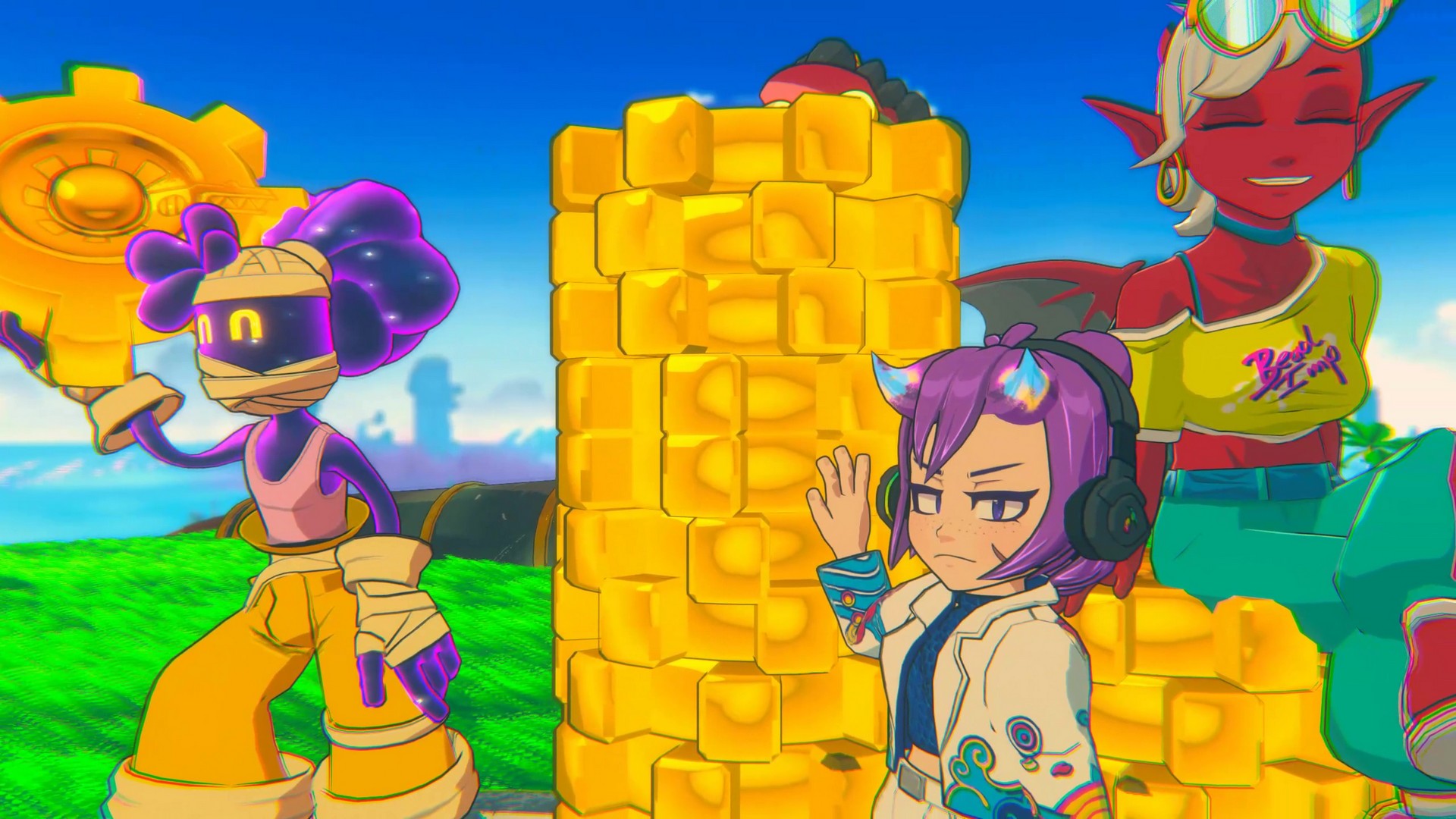The Making Of: Before Midnight
Julie Delpy, Richard Linklater talk behind-the-scenes
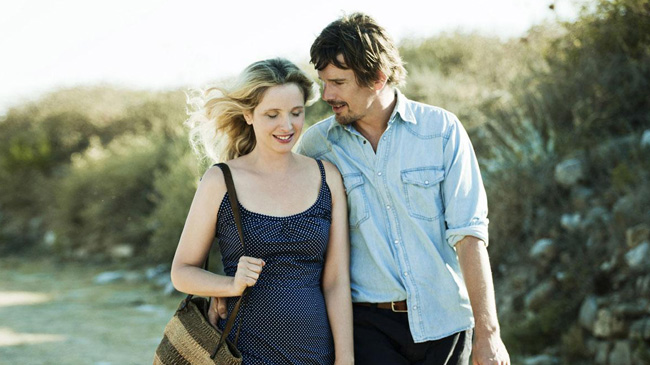
How has your relationship with each other evolved over the years?
Julie Delpy: We have such a good work relationship, right from the first film when Richard (Linklater) asked us to do more than just being actors, and to write the screenplay together. That's when we realised that we really liked this process.
It's not just with Ethan (Hawke), either - really, we're more of a threesome *laughs* Erm, not like that! We really work as a three creative partner team. It's only got stronger and stronger over the years.
Richard Linklater: On the one hand, we work together in the same way - it's the same vibe, creatively, in the room. It's like a band when you jam together - something kind of clicks. I think you get more comfortable - you really know each other so well.
The first time we worked together, we were still getting to know each other, and you don't want to hurt anyone's feelings. Now, we're such close comrades, it's created a really interesting relationship to the movie. Jesse and Celine have their own long-term relationship, but then so do Ethan, Julie and myself. We've got our own long-term relationship - it's, erm, creative - not the sexual stuff. *laughs*
But we can really goof around - we know each other so well. It just makes great collaboration. It's a fun process, but we're also really demanding of each other.
We push each other because we're like family, and when you have that kind of common acceptance for each other, then we can push each other.
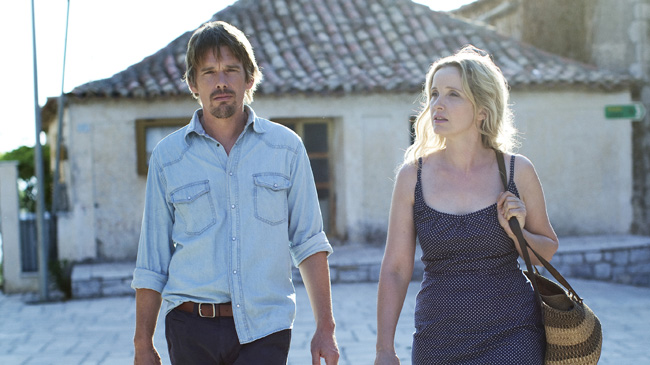
Has the writing process evolved since Before Sunrise?
Delpy: It's a little bit different because of our lives - the first film, when we were in Vienna, it was new to us. The second film, we wrote a lot over the internet - I'd send them a first draft, then they added more stuff, then Ethan sent me four pages of monologue that I'd turn into a dialogue.
We just collaborated in a different way. With this film, it was a little different as our lives are different - I have a kid, I direct movies and I'm quite busy. I was totally not focused until I got to Greece and we were locked in that room for two months. It was a bit of a different process - we wrote a lot not with each other in the past, but in this one, we had to be together to write it, and that's good as it's reflective of a couple who's been together for some of their life.
Linklater: Each film is different. The first film, the anticipation was all about the rewriting. That's what I demanded of them - to create these characters together, and to really give themselves to these characters. I even let them name their characters - I think in the original script they were even named something else. I just thought that for that film to work they had to own it, they had to be 100% invested creatively.
Once the idea had been originated, we worked differently on the next two movies. On Before Sunset , we worked separately for about a year floating by ideas, and rewriting each other.
On Before Midnight , it wasn't working in the same way - we got together and worked in a room together for ten weeks, and that was right for this movie. It was more domestic - we were in a room, they're in a long-term relationship. It was kind of suited to the movie.
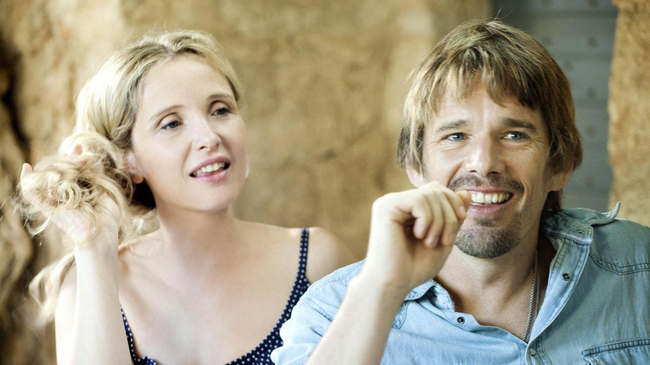
Do you ever have disagreements on where the characters are at after such a long break?
Delpy: That's the first thing we did - back in 2010, we sat together and decided 'they are together'. At first we thought it'd be following their everyday life, but then we thought no, they are going to be on a holiday.
They're outside of their everyday life. It's still there though, because that's where couples are even when they're not, you know? The main decision of what it was - that they're on holiday in a Mediterranean country - was decided six months before.
Linklater: The disagreements are so subtle that they resolve themselves so quickly, that's kind of our creative vibe. I instinctively knew on the first film that I couldn't impose anything on the movie, and neither could they.
It had to be mutually vetted and approved by everyone, otherwise it just wasn't going to work. You see a lot of movies where people are trying to force something.
With us, each person gets to state their case, but if the other two aren't feeling it, then you accept it and go away, and then it's up to you to make it more original or more funny. If something's not landing, you never have to convince someone else - you just have to win them over with the work.
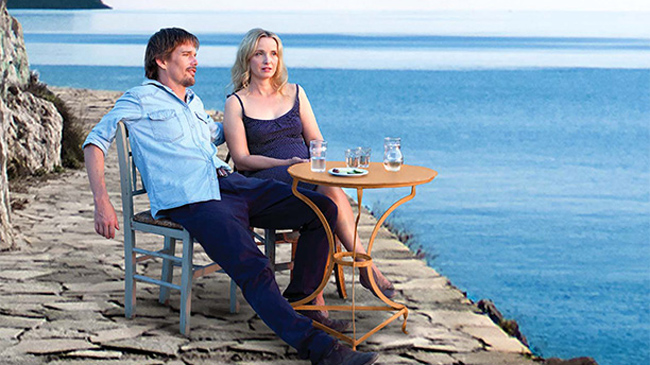
Do you try to fill in the gaps in your head for where the characters are at, before you all meet up?
Delpy: The back story is a big chunk of the work. Every actor, every writer has to do it, but here we have to do it so precisely, because in the film we need to know every detail - that a holiday didn't go well, that there was a summer where the kids were sick etc. A lot of the writing is figuring out what's happened, such as the resentments that have accumulated.
The whole fight scene in Before Midnight is about what's happened before the movie even started - you need to know the different levels of resentment - she doesn't let go of the fight, because she starts remembering mid-fight other resentments. If you watch the movie, the fight starts in the scene in the car. Then it's on pause, and it comes back - which is often the case in real life, sadly. He sets the ticking bomb in the car, and it explodes later. That's why she's not letting go.
Linklater: Oh yeah, we spend years doing that. It's as important as the writing. We take it from the last frame of the last movie - you have to think about what their day-to-day life is like, what they've been up to.
We spend a huge amount of time doing backstory so it can feel organic as a movie, and that it feels like they lived that life. We'll go down a story path for months of it basically being a different movie - we had a whole film that was just them leading their domestic lives.
Ultimately it wasn't the kind of movie we wanted to make, but it was good to go down that road and experience it. We did an outline for that, and it was a good experience for them to have lived that - some of it does make it into the finished movie. Not in their immediate world, but in their experiences.
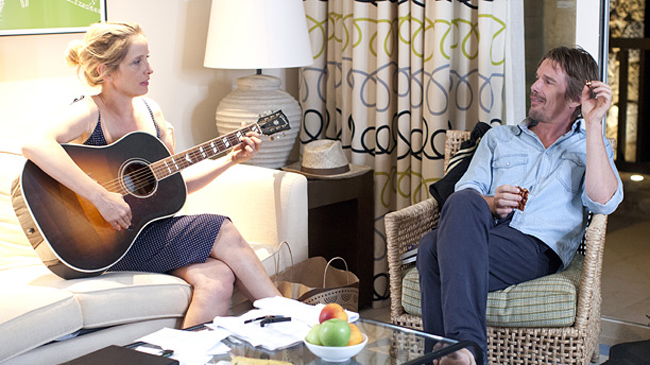
How hard is it to make each scene feel so natural and realist?
Delpy: It takes weeks and weeks of writing the conversation to make it seem real - it's more work than any other film in the writing. Also, the acting is harder than any acting I've done before - because getting that super naturalism is the hardest thing to achieve for an actor.
That's why when we started Before Midnight , I was like 'oh no, not again' *laughs* I almost didn't show up in Greece because I thought 'I don't want to do this.' As an actor, it's really torture.
The shoot is very short so we have no margin for error. Going back to that acting style is painful. You need to find the right tone of not being melodramatic, because actors love to overact. When you're not allowed to do that, it's actually very difficult. Especially when every word is written, and you're not even allowed to change a comma.
Total Film: So there's no improv? You never go off-piste?
Delpy: Not a word, not a comma. That's why we spend two weeks after the writing process just rehearsing, both with and without each other. Usually we get someone to run lines with us. Almost like in a play - just run run run run run the lines, to make it feel natural.
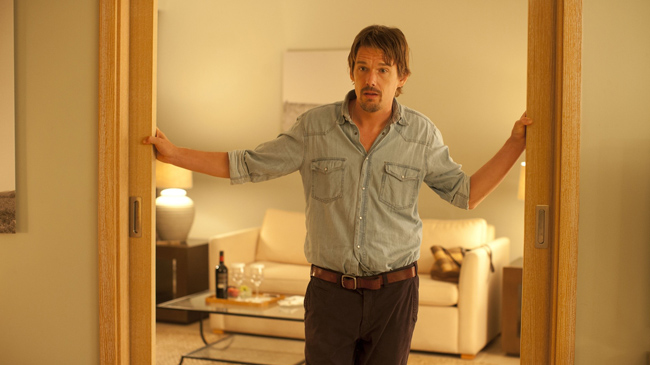
What would you say is your favourite scene from Before Midnight?
Delpy: I like the argument scene - it's entertaining and funny. It's a hard scene to pull off, what with just thirty minutes of people talking. In a way it's the ideal argument - we wrote, rehearsed and acted it out. I wish sometimes in the middle of an argument that I have that level of capacity - not to snap and throw a plate on the floor because I don't know what to say anymore. *laughs* At least here we can rehearse - there's nothing better than a pre-written argument.
Linklater: Oh gosh. You can't really pick favourites! The hotel room scene at the end is so important to the movie that it's both the most difficult thing to write, and pace and execute, and simultaneously it's the most fun to shoot. It was the hardest but the actors have more to go off. There's an argument in there, and all kinds of strange humour. It's fun. But it's not my favourite . I don't really think like that.
The movie really has three movies within it - the car scene, the dinner scene and the hotel room scene. The interior pacing of each of those scenes is a unique opportunity. With most movies you don't give yourself that time to explore each scene, but we've given ourselves a canvas that enables us to do that. You can truly explore something - it's not a one time hit on something. It's something you can really dig into.
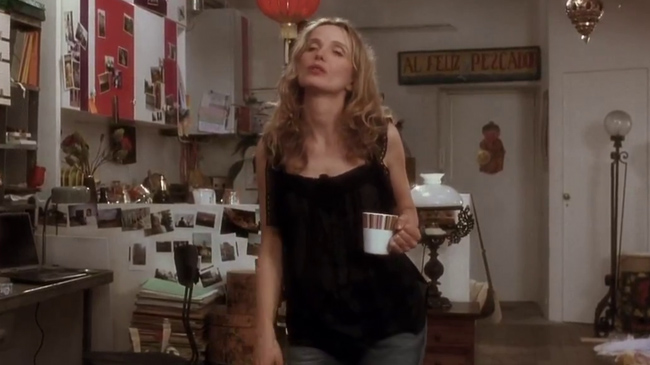
What's your favourite scene from the trilogy to date?
Delpy: I don't want to say the end of Before Sunset , because I wrote most of that scene, but... *laughs* I don't know. I do like the fight scene in Before Midnight . Because it's complex, and also because it's not a pleaser for people. In a way I like that scene more because it takes more risks, and it explores Celine.
To me, when someone tells me 'what a bitch' in that scene, well - if it's a man, I'm like 'you've never been with a woman. Obviously you've been dating girls 20 years younger than you and she's never said 'no' to you'. *laughs* And if it's a woman saying that, I think 'you've given up'.
That means a lot to me, that scene, because my character is not always friendly. She can be a bitch. But she has to be - otherwise she'll give up her career and her dreams. I love that scene because it's not a cute scene. It's funny and it's dark and it's not cute - and I like that.
Linklater: Again, I can't really pick! I don't think that way. Favourite?! I accept them all! You accept the whole package - I could tell you stories about every single scene, and how it came about, where it went to, what I feel is special about it, or why it's personal… I couldn't really single one out.
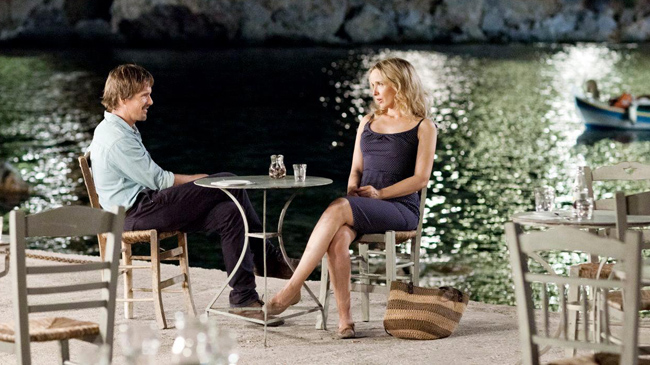
Do you see Before Midnight's ending as positive or negative?
Delpy: I know it's hope, but it's just the beginning of another stage. It's like 'ok, we stay together but…'. Relationships and making it work, it's a tough balance - that someone doesn't give up everything. Sadly, often, one person gives up a lot, and - not to be feminist, but it's often the woman.
I felt like that's a big deal in a relationship - how do you keep your dreams, stay yourself, do what you want to do with yourself - all the compromise. How do you accept compromise without hitting 50 and being hateful and resentful?! It's a big deal. A lot of people drop everything, but it's all about finding the right balance.
Linklater: It's both. It's the ultimate ambiguity of life. You have to be honest with yourself. You have to be like 'well, where am I at?'. The whole movie is a contemplation of that. Jesse and Celine - we find them in what's essentially paradise, with everything they may have wanted nine years ago; they're together, their careers seem ok, but there's still a general disgruntlement about being a human being in the modern world.
That hovers over the whole thing - and how tough it is to negotiate space with someone else. You get older, you settle in and you think - what is the definition of love? There's a complexity there that you can't ever imagine when you're super-young. It's just impossible.
I've been happy with the response - for each person, it's a complete absolute reflection of where you are in your life, and your relationship.
I've met people who felt empowered by it - 'oh that's great, you can work through it, you preserve and your prevail' and I know other people who come out of it thinking 'oh they're doomed, they have to break up'. It's just about where you're at and it can be both. In any relationship, you can think 'this is the end' and you start to visualise yourself in a new situation, but then there's renewal.
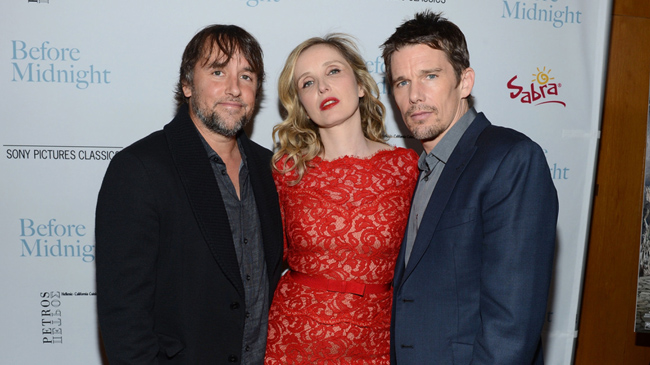
Do you have any plans for the next 'Before' movie?
Delpy: I have no idea. We don't even start discussing it until five or six years after the last one finishes! We only finished filming the last one a few months ago! *laughs* For me, it's like, if it's done, I'm happy. But while the films are always an intense period of work, it obviously works.
Linklater: We've no plans - we're enjoying a five year radio silence.
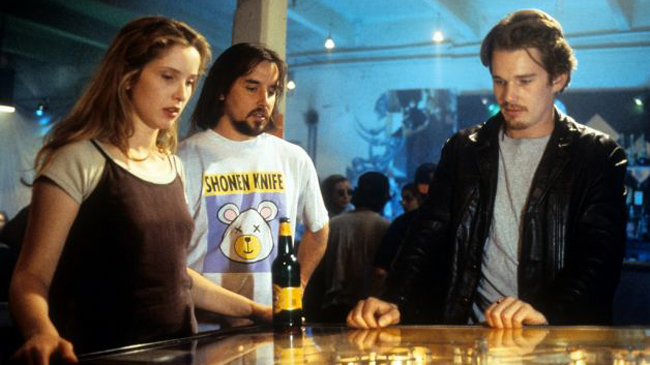
You've been working together for over 20 years now - can you remember your initial impressions of each other?
Delpy: Richard, I remember someone very laid back - and he still is! Ethan, I remember being very different. They both have very different energies! I'd say, Ethan was a little cockier than he is now. *laughs*
He wasn't as nice when he was in his early 20s, but then neither was I! *laughs* Richard has been very much the same over the years. He's been steadily the same - and Ethan's evolved for the best.
Linklater: Twenty years ago this October I met them auditioning for this movie. So, my initial impression was that I liked them - they seemed smart, and curious and creative. And I knew them to be good actors, but that wasn't enough.
They needed to click with someone else and it had to work in some way. They were the right two at that time, and I feel fortunate that it happened that way.
It's like talking about how you met your family. They've just always been there. It's one of the greatest joys of my unpredictable cinematic life. Because of these three movies, I've got to experience one of the great creative joys of my career.
Before Midnight is out now on DVD from Sony Pictures Home Entertainment.
Weekly digests, tales from the communities you love, and more
You are now subscribed
Your newsletter sign-up was successful
Want to add more newsletters?

Every Friday
GamesRadar+
Your weekly update on everything you could ever want to know about the games you already love, games we know you're going to love in the near future, and tales from the communities that surround them.

Every Thursday
GTA 6 O'clock
Our special GTA 6 newsletter, with breaking news, insider info, and rumor analysis from the award-winning GTA 6 O'clock experts.

Every Friday
Knowledge
From the creators of Edge: A weekly videogame industry newsletter with analysis from expert writers, guidance from professionals, and insight into what's on the horizon.

Every Thursday
The Setup
Hardware nerds unite, sign up to our free tech newsletter for a weekly digest of the hottest new tech, the latest gadgets on the test bench, and much more.

Every Wednesday
Switch 2 Spotlight
Sign up to our new Switch 2 newsletter, where we bring you the latest talking points on Nintendo's new console each week, bring you up to date on the news, and recommend what games to play.

Every Saturday
The Watchlist
Subscribe for a weekly digest of the movie and TV news that matters, direct to your inbox. From first-look trailers, interviews, reviews and explainers, we've got you covered.

Once a month
SFX
Get sneak previews, exclusive competitions and details of special events each month!
